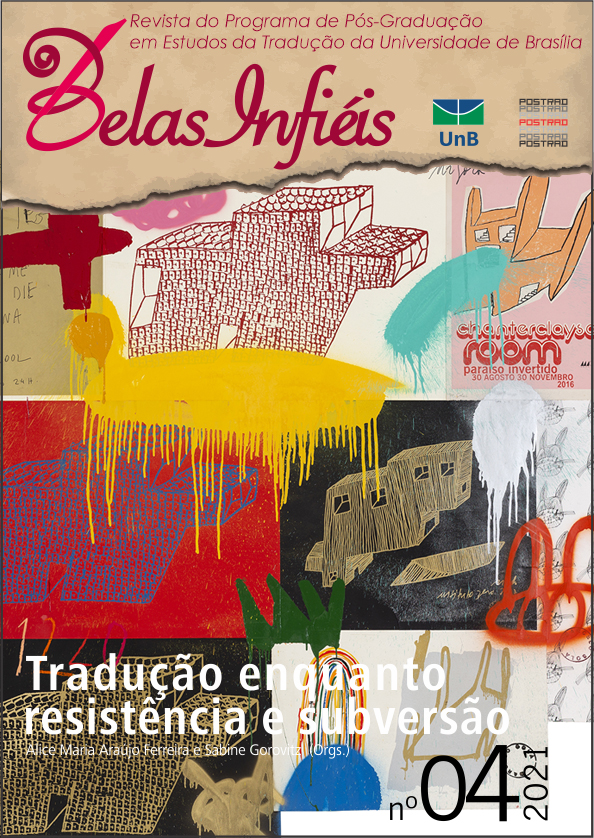Tradu-Tizar: A Tradução enquanto Resistência e Subversão
DOI:
https://doi.org/10.26512/belasinfieis.v10.n4.2021.36521Palavras-chave:
Tradução e subversão. Tradução política. Direitos linguísticos. Ética de tradução. Políticas linguísticas. Políticas de tradução.Resumo
Este artigo introduz o número Tradução como resistência e subversão da revista Belas infiéis, partindo de um diálogo em torno da tradução como ação política de correção de assimetrias linguísticas e socioculturais, construídas por séculos de dominação de uma comunidade sobre outra. Essas relações desiguais entre línguas formam o pano de fundo de uma discussão maior que coloca em perspectiva os direitos linguísticos, sugerindo uma reflexão sobre os direitos de tradução: o direito a ser traduzido, o de se traduzir e o de traduzir. Como um processo de realocação textual do qual emergem outros significados, a tradução confere novos espaços para a subjetivação e o diálogo. Ela ilustra e manifesta o contato, o confronto e o conflito - de línguas, falantes, normas e percepções do mundo. Assim, novos engajamentos emergem da circulação das vozes que a tradução proporciona. Em uma escala supranacional, se estabelece ora como um recurso de visibilidade de línguas e textos tornados historicamente invisíveis, promovendo diversidade linguística, ora como agente de homogeneização linguística e cultural. Por isso, amplia-se a discussão à ética da tradução, questão inseparável das questões políticas que levanta, já que são relações que estão em jogo.
Downloads
Referências
Benjamin, W. (1971), La tâche du traducteur. Mythe et violence, 1, 261-262.
Berman A. & Chanut M.E.P. (2002), A prova do estrangeiro: cultura e traducã̧o na Alemanha romântica; Herder; Goethe; Schlegel; Novalis; Humboldt; Schleiermacher; Hölderlin. Edusc.
Berman A. (2008), « L’Âge de la traduction ». In « La tâche du traducteur » de Walter Benjamin, un commentaire, Saint-Denis, PUV.
Berman, A. (1984), L’Épreuve de l’étranger. Culture et traduction dans l’Allemagne romantique. Paris, Gallimard.
de Castro, E. V. (2009). Métaphysique Cannibales. Paris, PUF.
Derrida J. (1982), L'oreille de l'autre, Otobiographies, transferts, traductions. Textes et débat avec Jacques Derrida, Montréal, Vlb Éditeur.
Derrida, J. (1997), Anne Dufourmantelle invite Jacques Derrida à répondre De l´hospitalité. Calman-Levy, Paris.
Fiola M. A. (2004), « Présentation », in TTR, Traduction, terminologie, rédaction, Volume 17, numéro 2, 2e semestre, p. 9-12.
Godard, B. (2001), L’Éthique du traduire: Antoine Berman et le « virage éthique » en traduction. TTR, 14 (2), 49”“82. https://doi.org/10.7202/000569ar
Harris S.C. (1990), « Two-way Aboriginal schooling: education and cultural survival », Canberra: Aboriginal Studies Press.
Iveković R. (2009), « Que veut dire traduire? », Revue Asylon (s), (7).
Iveković R. (2019), « The epochal issue of migrations. The cosmopolitics of state closure. (The closure of Europe) » at the Institute of Social Research & Cultural Studies/ International Center for Cultural Studies, ICCS/IICS, Chiao Tung University, Hsinchu, Taiwan, in the Autumn semester of 2019-20.
Iveković R. (2019b), Politiques de la traduction : exercices de partage, Terra-HN éditions, Alterego. e-book Politiques de la traduction. Exercices de partage (A Politics of translation), http://www.reseau-terra.eu/IMG/pdf/-5.pdf, page 193.
Juillard C. (1997), « Accommodation linguistique ». In : MOREAU, M-L, Sociolinguistique: concepts de base. Paris : Mardaga, pp. 12-14.
Kisukidi N. Y. (2017), Que fait-on de l'étranger aujourd'hui?, Séminaire de la Journée d’étude de la Chaire « Exil et migrations ». Disponible : https://www.canal-u.tv/video/fmsh/que_fait_on_de_l_etranger_aujourd_hui_nadia_yala_kisukidi.44953
Meschonnic H. (2007), Éthique et politique du traduire. Verdier, Paris.
Meschonnic H. (1999), Poétique du traduire. Verdier, Paris, 1999.
Nouss A. (2020), « Le mensonge du migrant : un défit éthique ». In : CASTELAIN, Arnold (dir.) Traduction et migration : Enjeux éthiques et techniques. Presses de l’Inalco, Paris.
Ottoni P. (1998), Tradução. A prática da diferença. Campinas, SP: Unicamp.
Samoyauly T. (2020), « Langues en lutte : limites des éthiques de la traduction ». In : CASTELAIN, Arnold (dir.), Traduction et migration : Enjeux éthiques et techniques. Presses de l´Inalco, Paris.
Spivak G. C. (2005), Tradução como cultura (tradução de Eliana Ávila e Liane Schneider). In: Ilha do Desterro Florianópolis nº 48, p.41-64 jan./jun. Disponible : https://periodicos.ufsc.br/index.php/desterro/article/view/9833. Accès: 13/03/2020.
Spivak G. C. (1993), « The Politics of Translation ». In Outside the Teaching Machine. New York: Routledge, p. 200-225, 1993.
Venuti L. (1998), The Scandals of Translation: Towards an Ethics of Difference. New York, Routledge.
Wright S. (2004), « L’avenir du ready-made réciproque : valeur d’usage et pratiques para-artistiques », in Parachute, n°. 117.
Downloads
Publicado
Como Citar
Edição
Seção
Licença
Copyright (c) 2021 CC BY

Este trabalho está licenciado sob uma licença Creative Commons Attribution 4.0 International License.
Dado ao acesso público desta revista, os textos são de uso gratuito, com obrigatoriedade de reconhecimento da autoria original e da publicação inicial nesta revista
A revista permitirá o uso dos trabalhos publicados para fins não comerciais, incluindo direito de enviar o trabalho para bases de dados de acesso público. As contribuições publicadas são de total e exclusiva responsabilidade dos autores.
Os autores, ao submeterem trabalhos para serem avaliados pela revista Belas Infiéis, mantêm os direitos autorais e concedem à revista o direito de primeira publicação, sendo o trabalho licenciado sob a Creative Commons Attribution License Atribuição 4.0 Internacional (CC BY 4.0).



















